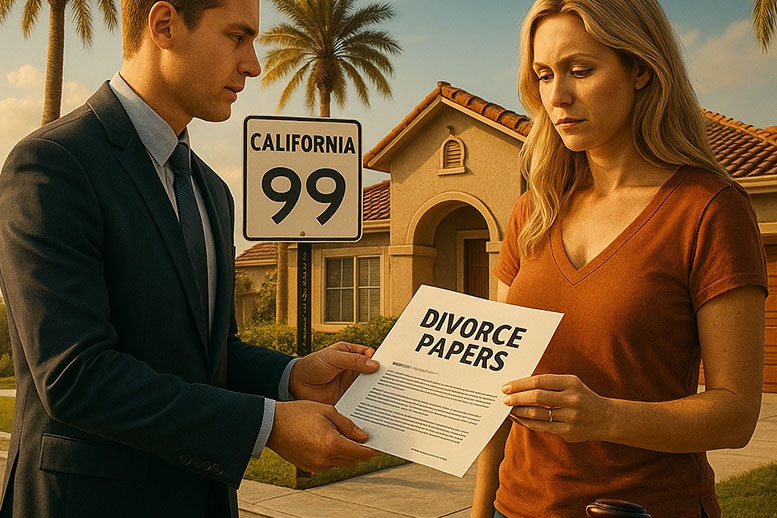Serving your spouse with divorce papers is a critical legal step in the California divorce process. While the term might sound intimidating, it simply refers to a formal and court-recognized way of notifying your spouse that you have initiated divorce proceedings.
However, this step must be handled properly to avoid delays, complications, or invalidation of your case. If you live in Tracy, Stockton, or anywhere in San Joaquin County, understanding how to serve divorce documents correctly is essential to moving your divorce forward.
At Bansmer Law, we have over a decade of experience helping people navigate the complex California divorce process. We put together this guide explaining how to serve divorce papers in CA correctly and how to avoid common mistakes that can complicate your case.
What Does “Serving Divorce Papers” Mean in California?
Serving divorce papers in California means delivering the initial legal documents to your spouse in a manner that complies with state law. These documents include the Petition for Dissolution of Marriage (Form FL-100), a Summons (Form FL-110), and potentially other forms depending on your situation.
Service ensures that your spouse is formally and legally notified of your intention to divorce. Until service is completed and documented with the court, your case cannot proceed.
In California, this is known as “personal service,” and it is the foundation upon which the court asserts jurisdiction over the responding party. It is essential to understand that, as the spouse filing for divorce (the petitioner), you cannot serve the papers personally. Someone else must do it on your behalf.
What Paperwork is Needed Before Serving Your Spouse?
Before you serve your spouse, you must complete and file several documents with the Superior Court in San Joaquin County (or whichever county you reside in). These typically include:
- Petition for Dissolution of Marriage (FL-100)
- Summons (FL-110)
- Declaration Under Uniform Child Custody Jurisdiction and Enforcement Act (FL-105), if you have children under 18
- Request for Order (FL-300), if you are requesting temporary orders such as custody, visitation, or spousal support
- Blank response forms, including the Response (FL-120) and, if applicable, other related documents your spouse may need to complete
Make two copies of each form—one for your spouse and one for your records. You cannot legally serve the paperwork until these documents are filed with the court and you receive filed copies back from the court.
Who Qualifies as a Valid Server for Divorce Papers in California?
Under California law, a person serving divorce documents must meet specific qualifications:
- Must be at least 18 years old
- Must not be a party to the divorce (you cannot serve your own spouse)
- Must be able to complete a Proof of Service form and, if needed, testify that the service was done correctly
You have several options for who can serve the papers:
- A trusted friend or relative who meets the criteria
- A professional process server
- The county sheriff (available in most counties for a fee)
Each option has pros and cons. For example, while a friend may be cost-effective, hiring a professional process server guarantees accuracy and efficiency—especially if your spouse is evasive or difficult to locate.
Step-by-Step Guide: How to Serve Divorce Papers in California
- Choose a server. Select a qualified person to serve the papers.
- Prepare the paperwork. Include all filed forms and any required blank response forms.
- Arrange for personal service. Your server must hand the papers directly to your spouse. If your spouse refuses to accept them, the server may leave the papers in close proximity and note the refusal.
- Complete Proof of Service (FL-115). The server fills out this form, which details when and how the papers were served.
- File the Proof of Service. Submit FL-115 to the court to prove that service was completed.
If you are also serving a Request for Order (FL-300), be aware that it must be served at least 16 court days before the scheduled hearing. Count only court days (not weekends or holidays) when calculating your deadline.
Timeframes and Deadlines to Know
- Initial service deadline – The court expects you to serve your spouse within 60 days of filing your Petition, unless you request an extension
- Response time – Your spouse has 30 days from the date of service to file a response (FL-120)
- Minimum divorce timeline – The earliest a divorce can be finalized in California is six months and one day from the date of service
Missing these deadlines may stall or complicate your case, so careful calendaring is one of the best things you can do.
What if I Can’t Find My Spouse to Serve Divorce Papers?
If you cannot locate your spouse despite reasonable effort, you may request the court’s permission to serve via substituted service or publication. Before doing so, you must demonstrate that you have exhausted all reasonable methods to find them, such as:
- Contacting relatives or friends
- Searching social media
- Checking with their last employer
If the court grants permission, substituted service means you can leave the papers with someone at your spouse’s home or workplace and follow up with a mailed copy. Service by publication allows you to publish a notice in a court-approved newspaper.
Each of these methods requires prior court approval, and the process can be complex. Working with an experienced family law attorney, such as Erica Bansmer of Bansmer Law, is highly recommended in these scenarios.
What if My Spouse Refuses to Accept the Papers?
Refusal does not prevent service. If your spouse refuses to take the documents, the server can simply leave them within reach and note the refusal on the Proof of Service. The service is still considered valid under California law.
Deliberate avoidance of service can be addressed by switching to a professional process server or filing a motion for substituted service.
How to Obtain Court-recognized Proof of Service
After the papers are served, the server must complete Proof of Service of Summons (FL-115). This form must include:
- The server’s name and address
- The date, time, and location of service
- A description of the person served (if needed)
- A statement indicating personal delivery or other approved method
Once signed, you must file the original FL-115 with the family court clerk and retain a copy for your own records. Without this, your case cannot move forward.
Common Mistakes to Avoid When Serving Divorce Papers
- Serving the papers yourself (this invalidates service)
- Forgetting to include blank response forms for your spouse
- Failing to file the FL-115 promptly after service
- Serving too close to your hearing date if using FL-300
- Assuming informal delivery (email, text, or verbal notice) is sufficient
Do Not Let a Technical Mistake Derail Your Divorce
Serving divorce paperwork correctly might seem like just a formality, but it is actually a crucial step that affects every other aspect of your case. When handled incorrectly, it can delay proceedings, lead to additional costs, or even force you to start the process over from the beginning.
At Bansmer Law, we proudly serve clients in Tracy, Stockton, Manteca, Lodi, Lathrop, Ripon, and throughout San Joaquin County. Whether your spouse is cooperative or evasive, local or out of state, our experienced team handles every detail with precision and proven legal strategies.
To schedule your 60-minute consultation with Attorney Erica Bansmer, call us today at (209) 474-2400.


 CALL US NOW
CALL US NOW










